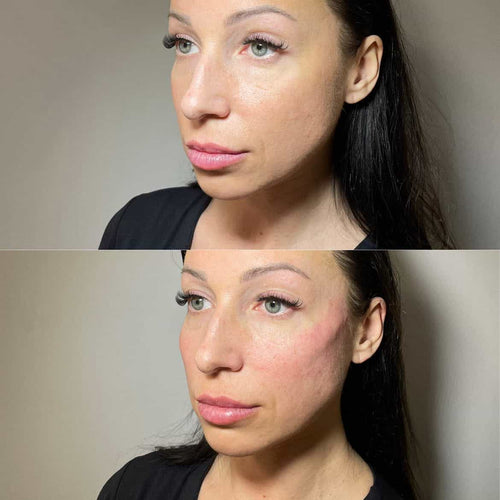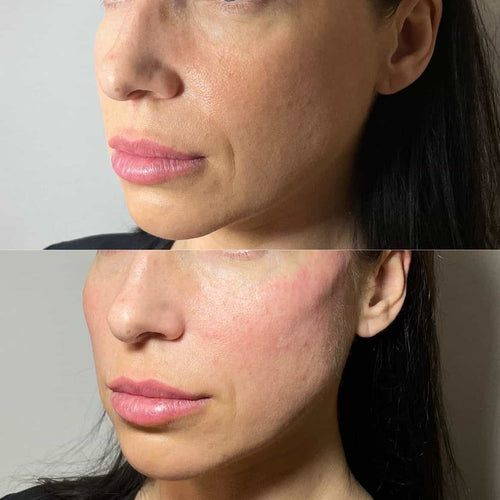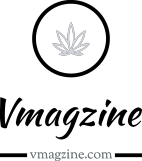Book a Dermal Filler Consultation at It’s Me and You Clinic with Dr. Laura Geige
Immediate Actions
Cold Compresses
Immediate actions taken after lip filler injections can significantly minimize bruising and swelling.
Here’s what you should do:
-
Ice the Area: Apply a cold compress to your lips for 10-15 minutes at a time, several times per day. This helps constrict blood vessels and reduce inflammation.
-
Elevate Your Head: Sleeping with your head elevated can help prevent fluid buildup in the face, minimizing swelling.
-
Avoid Strenuous Activity: Refrain from strenuous exercise or activities that increase blood flow to your face for at least 24-48 hours post-injection.
-
Stay Hydrated: Drinking plenty of water helps flush toxins and promote healing.
Cold compresses are essential in the initial stages of reducing swelling and bruising. You can use:
-
Ice packs wrapped in a thin towel
-
Frozen gel packs
-
Cold spoons chilled in the freezer (for a few minutes)
Remember, it’s crucial to avoid rubbing or touching the injected area excessively. This can irritate the treated tissues and worsen bruising.
Apply a cold compress for 1020 minutes at a time, several times a day, especially during the first 24 hours after treatment. The National Institute of Dental and Craniofacial Research recommends this to reduce swelling and inflammation.
Immediate actions are crucial for minimizing bruising after lip filler treatment.
One of the most effective immediate steps is applying a **cold compress**. The National Institute of Dental and Craniofacial Research recommends this technique to reduce swelling and inflammation.
Apply the cold compress for *10-20 minutes* at a time, several times a day, especially during the first 24 hours after your treatment.
A cold pack wrapped in a towel can be used, or you can apply ice cubes directly to the area (but ensure they are not directly touching your skin).
Elevation
Immediate actions after lip filler injections are crucial for minimizing bruising and swelling.
Applying a cold compress to the treated area is one of the first steps. This can help constrict blood vessels, reducing bleeding and inflammation. Use an ice pack wrapped in a thin towel or chilled gel packs, applying for 15-20 minutes at a time, several times throughout the day.
Elevating your head while sleeping can also minimize swelling. Try using an extra pillow to keep your head elevated above your heart. This promotes drainage and reduces fluid buildup.
Avoid strenuous activity or any exercise that increases blood flow to the face for at least 24 hours after treatment. Strenuous activities can worsen bruising and swelling.
Refrain from touching or rubbing the treated area as this can irritate the injection sites and potentially cause further bleeding.
It is essential to follow your injector’s specific post-treatment instructions carefully as they may have additional recommendations based on the type of filler used and individual factors.
Elevate your head while sleeping with an extra pillow. This can help minimize blood pooling in the treated area.
Elevate your head while sleeping with an extra pillow to reduce swelling and bruising after lip filler treatment.
Gravity can cause blood to pool in the treated area, increasing inflammation and making bruising more noticeable. Elevating your head helps redirect blood flow away from your lips, promoting faster healing and reducing the appearance of discoloration.
Aim for a slight incline, keeping your head elevated several inches above your heart throughout the night.
Ongoing Care
Arnica Gel or Cream
Arnica is a flowering plant traditionally used to reduce bruising and swelling. Arnica gel or cream contains extracts from the arnica flower, and while research is limited, it’s often recommended for post-procedure care.
Applying arnica topically can potentially help with minimizing bruising after lip fillers by:

-
Improving blood circulation: Arnica may promote blood flow, which can aid in the removal of excess fluids and waste products associated with bruising.
-
Reducing inflammation: Arnica possesses anti-inflammatory properties that could help soothe the area and minimize swelling.
However, it’s important to note:
-
Evidence for arnica’s effectiveness in reducing filler bruising is largely anecdotal. More scientific studies are needed.
-
Arnica can sometimes irritate the skin. Perform a patch test on a small area before widespread application.
It’s best to follow your practitioner’s specific aftercare instructions, which may include using arnica or other recommended products.
Remember, managing bruising is a part of the healing process and will typically fade over time.
Consider using arnica gel or cream topically. The University of Maryland Medical Center suggests that arnica may be helpful in reducing bruising and swelling.
After getting lip filler, bruising and swelling are common side effects that usually subside within a few days.
Here are some tips to help minimize these effects:
Book Your Dermal Filler Appointment with Dr. Laura Geige
-
Apply ice packs: Gently apply an ice pack wrapped in a towel to the treated area for 10-15 minutes at a time, several times a day. This can help reduce inflammation and swelling.
-
Elevate your head: Sleeping with your head elevated can help minimize fluid buildup around your lips.
-
Avoid touching or rubbing your lips: This can irritate the area and potentially delay healing.
-
Stay hydrated: Drinking plenty of water can help flush out toxins and promote healing.
-
Consider using arnica gel or cream topically. The University of Maryland Medical Center suggests that arnica may be helpful in reducing bruising and swelling. Follow product instructions carefully.
It’s essential to follow your injector’s aftercare instructions carefully for optimal results and minimize any potential complications.
If you experience excessive bruising, swelling, or other concerning symptoms, consult your doctor or the injector immediately.
Healthy Diet and Hydration
Following lip filler treatment, proper **ongoing care** is crucial for minimizing bruising and promoting optimal healing.
Maintaining a healthy diet rich in nutrients like vitamin C and antioxidants can support collagen production and accelerate tissue repair.
Foods high in vitamin C include citrus fruits, berries, leafy greens, and peppers. Antioxidants are found in colorful fruits and vegetables such as blueberries, spinach, and tomatoes.
Adequate **hydration** is also essential for reducing swelling and promoting circulation. Drink plenty of water throughout the day, especially in the first few days after treatment.
Avoid consuming alcohol and caffeine, as these substances can dehydrate the body and potentially exacerbate bruising.
Applying a cold compress to the treated area for 10-15 minutes at a time, several times a day, can help reduce inflammation and minimize bruising.
Elevating your head while sleeping can also help to reduce swelling.
It’s important to avoid strenuous activities, excessive sun exposure, and touching or rubbing the treated area to prevent irritation and delay healing.
If you experience any excessive bleeding, discomfort, or signs of infection, consult your doctor immediately.

Eat a nutritious diet rich in vitamin C, which is essential for collagen production and healing. Stay wellhydrated by drinking plenty of water.
Ongoing care after lip filler injections plays a crucial role in minimizing bruising and promoting optimal healing. Following these tips can significantly contribute to a smoother recovery.
Eat a nutritious diet rich in vitamin C, which is essential for collagen production and the body’s natural healing process. Vitamin C aids in tissue repair and strengthens the skin, helping to reduce bruising and promote faster healing.
Stay well-hydrated by drinking plenty of water throughout the day. Water flushes out toxins and helps transport nutrients to tissues, facilitating healing and reducing inflammation associated with bruising.
Book a Dermal Filler Session with Dr. Laura Geige Now
Preventing Future Bruising
Consult a Qualified Professional
Bruising after lip fillers is a common side effect that usually resolves on its own within a few days to a week.
To minimize bruising, it’s essential to follow your injector’s pre- and post-treatment instructions carefully.
Prior to the procedure, avoiding alcohol and blood thinners like aspirin or ibuprofen for at least 24 hours beforehand can help reduce bruising.
On the day of the treatment, applying a cold compress before and after the injections can also minimize swelling and bruising.
Aftercare is equally crucial. Applying a cold compress intermittently throughout the first 24 hours can further reduce inflammation.
Gentle massage of the treated area may help to disperse any blood pooling and promote healing.
Over-the-counter arnica cream or gel can be applied topically as it is believed to reduce bruising.
However, if you experience excessive or persistent bruising, it’s crucial to consult a qualified medical professional.
They can assess the situation and recommend appropriate treatment options.
Remember, seeking expert advice ensures the best possible outcome and minimizes any potential complications.
Choose a licensed and experienced injector who uses sterile techniques and highquality products. The American Society of Plastic Surgeons recommends careful selection of your provider.
Preventing bruising after lip filler injections requires a multi-pronged approach that starts with choosing the right injector and understanding your own individual risk factors.
Choosing an experienced and qualified injector is paramount. Look for someone licensed, experienced in dermal fillers, and who adheres to strict sterile techniques. The *American Society of Plastic Surgeons* recommends carefully vetting potential providers, checking their credentials, and reading patient reviews.
In the days leading up to your appointment, consider adjusting your lifestyle to minimize bruising risk. Avoid taking blood thinners like aspirin or ibuprofen as they can increase bleeding. Talk to your doctor about temporarily pausing any medications that might thin your blood.
Also, be mindful of alcohol consumption before and after the procedure. Alcohol can interfere with blood clotting.
On the day of your appointment, avoid applying makeup or skincare products to your lips. Keep the area clean and dry.
After your injection, follow your injector’s post-procedure instructions carefully. This may include avoiding strenuous activity, heat exposure, and sun exposure. Applying a cold compress can help reduce swelling and bruising.
While these steps can significantly reduce the likelihood of bruising, remember that it’s a normal side effect for some individuals. If you experience excessive or prolonged bruising, contact your injector promptly.
Manage Medications and Supplements
Preventing future bruising during lip filler treatments can be achieved by taking proactive steps before and after your appointment.
Before Your Appointment:
- Avoid blood-thinning medications and supplements for at least two weeks prior to your procedure. This includes aspirin, ibuprofen (Advil, Motrin), naproxen (Aleve), vitamin E, and fish oil.
- Consult with your doctor about any concerns you have regarding medication interactions or potential side effects.
- If you’re prone to bruising easily, consider using an over-the-counter arnica cream a few days before your appointment. Arnica is thought to help reduce inflammation and bruising.
During Your Appointment:
- Communicate with your injector about any concerns or past experiences with bruising.
- Inquire about numbing creams or techniques that can minimize discomfort and potential blood vessel damage.
After Your Appointment:
- Apply a cold compress to the treated area for 10-20 minutes at a time, several times a day. This helps constrict blood vessels and reduce swelling.
- Avoid strenuous exercise, alcohol consumption, and excessive sun exposure for at least a few days after your treatment.
- Elevate your head when lying down to minimize fluid buildup in the treated area.
**Managing Medications and Supplements**
It’s crucial to be aware of the medications and supplements you take, as they can significantly impact bruising. Always consult with a medical professional before making any changes to your medication regimen, especially if you are considering lip filler injections.
- Blood Thinners: Aspirin, ibuprofen (Advil, Motrin), naproxen (Aleve), and warfarin (Coumadin) are common blood thinners that can increase the risk of bruising. It’s essential to discuss these medications with your doctor before your appointment.
- Vitamin E and Fish Oil: These supplements can also have a thinning effect on the blood, potentially leading to increased bruising.
**Other Factors:**
Remember that individual factors such as age, genetics, and skin type can influence bruising tendencies. If you are concerned about potential bruising from lip filler injections, talk to your injector. They can offer personalized advice and guidance based on your individual needs and medical history.
Inform your injector about any medications or supplements you take, especially blood thinners like aspirin or ibuprofen. These can increase bruising risk.
Preventing bruising after lip filler injections involves several steps, both before and after the procedure.
Here are some tips to minimize bruising:
- Inform your injector about any medications or supplements you take, especially blood thinners like aspirin or ibuprofen. These can increase bruising risk.
- Avoid alcohol consumption for at least 24 hours before and after the injections. Alcohol can thin the blood.
- Stop smoking several days before and after the procedure, as nicotine constricts blood vessels and hinders healing.
- Eat a healthy meal a few hours before your appointment.
- Manage stress levels in the days leading up to the injection. Stress can also increase blood flow and bruising risk.
- Apply ice packs to the area for 15-20 minutes at a time, several times a day, after the injections.
- Avoid touching or massaging the treated area for at least 24 hours.
- Use arnica gel or cream topically, as it is believed to help reduce bruising and swelling.
- Sleep with your head elevated.
- Stay hydrated by drinking plenty of water.
Following these tips can significantly reduce the chances of experiencing excessive or prolonged bruising after lip filler injections.
One One Three Online W1 Wellness Humboldt Apothecary CBD
- The Growing Demand For THC Beverages Among Gen Z - May 31, 2025
- Skin Pen Microneedling Near Albury, Surrey - May 31, 2025
- Thc Soda In Illinois IL - May 30, 2025
